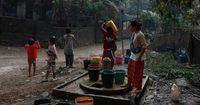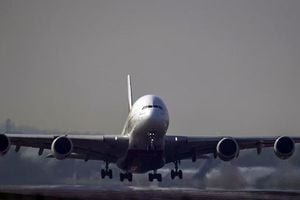As the sun rises over the Thai-Myanmar border, the landscape is marked by both the visible and the hidden: bustling checkpoints, sprawling refugee camps, and, tragically, the ever-present threat of landmines. Recent weeks have seen a convergence of long-simmering crises in this region—security tensions with Cambodia, mounting humanitarian needs among Myanmar refugees, and international pressure on Thailand’s government to respond decisively.
On August 12, 2025, the Thai government announced an ambitious plan to increase the number of official border checkpoints to seven, a move designed to tighten control and improve monitoring of cross-border activities. According to statements released by the Ministry of Foreign Affairs and reported by local media, this expansion comes in direct response to a series of violent incidents along the border, including the repeated use of landmines by Cambodian forces. The new checkpoints, coordinated with the United Nations Border Committee (GBC), are intended to enhance both security and humanitarian management in regions experiencing heavy cross-border movement.
This announcement followed a particularly harrowing incident: on August 12, a patrol from the 2610th Ranger Company, consisting of seven soldiers, was struck by an anti-personnel landmine while on duty in Surin province. It was not the first such tragedy. As detailed in the government’s statement, this marked the fourth time Thai personnel have been harmed in similar circumstances—an ongoing pattern that officials say violates both the ceasefire agreement and international law. "The Thai government strongly condemns the use of anti-personnel landmines by the Cambodian side, which has occurred repeatedly and in bad faith," the statement read. "Such actions are contrary to international law, the fundamental principles of the United Nations Charter, and violate commitments under the Ottawa Convention and international humanitarian law."
The gravity of the situation prompted Thailand to lodge an official protest with Cambodia and the UN, calling on the international community—particularly organizations aiding Cambodia in mine clearance—to reconsider their assistance. The government also hinted at the possibility of further retaliatory measures, underscoring its disappointment with Cambodia’s "lack of sincerity" and its demand for immediate compliance with international agreements. The statement went on to urge ASEAN observers to scrutinize future border developments, emphasizing the need to protect innocent civilians on both sides.
But the border is not just a flashpoint for military tensions. It is also home to more than 100,000 refugees from Myanmar, many of them ethnic Karen who fled decades of conflict and, more recently, the aftermath of Myanmar’s 2021 military coup. These refugees now face a new crisis: on August 11, 2025, Human Rights Watch (HRW) reported that drastic aid cuts are putting this vulnerable population at “grave risk.” The organization’s findings, echoed by reports from The Border Consortium and other humanitarian agencies, paint a bleak picture of life in the camps.
HRW’s report highlighted the devastating impact of reduced humanitarian assistance, the result of both the Trump administration’s foreign aid cuts and declining donations from other sources. The Border Consortium, which has historically provided food and basic necessities, was forced to halt almost all food aid as of July 31, 2025. Similarly, the International Rescue Committee ended essential healthcare services in all nine refugee camps along the Thai-Myanmar border. These cuts have left refugees struggling to survive, with basic services such as food, healthcare, and shelter now in jeopardy.
“In the past, we received enough assistance,” a 34-year-old refugee told Human Rights Watch. “But then the support was gradually reduced. Even with 77 baht per month, it’s barely enough to buy anything.” The consequences have been dire: chronic malnutrition among children under five has risen for the first time in a decade, and mental health issues—including depression—are reportedly on the rise as hope for resettlement fades.
Refugees are legally barred from working outside the camps and cannot travel freely, forcing them to rely almost entirely on international aid. Some have resorted to informal labor, risking arrest, extortion, or deportation. “We feel like we’re trapped in our own homes,” another refugee said. “If the Thai government allowed us to work, it would benefit everyone. We could support ourselves and our families.”
The HRW report criticized the Thai government’s inaction, noting that while the National Security Council has proposed measures to address the aid shortfall, the Ministry of Interior has yet to formalize any policy changes. Shayna Bauchner, HRW’s Asia researcher, urged immediate reform: “The U.S. humanitarian aid cuts should prompt the Thai government to change its policy toward the 100,000 Myanmar refugees in border camps. These refugees want to care for their families, and if allowed to work, they would benefit Thailand’s economy.”
The situation is further complicated by the growing number of Myanmar nationals entering Thailand since the 2021 coup. The refugee camp population has swelled by 35 percent, and the continued violence—including airstrikes and landmine use by Myanmar’s military—means that returning home is not an option for most. The camps, established in the 1980s, now shelter over 107,000 people, according to Thai and UNHCR data.
With food aid nearly eliminated, families are facing impossible choices. Some women have borrowed money at steep interest rates to pay brokers for illegal passage to Bangkok, exposing themselves to the risk of human trafficking and abuse. Others, including children, have been forced into labor or even petty theft to survive. In one reported case, a single mother of five was caught stealing a sack of rice—an act driven by desperation rather than criminal intent, according to camp officials.
Education has also suffered. More children are being sent out to work, and parents question the value of schooling when employment prospects are so bleak. “They’ve seen that those who finished school still can’t find work,” an education coordinator explained. Meanwhile, health services have been slashed, with the closure of clinics and a reduction in medical staff, leaving many without access to essential care.
Amid these overlapping crises, international organizations and donors are being called upon to step in. HRW’s Bauchner urged, “Donor countries should urgently fill funding gaps for the camps while also pressing Thailand to allow refugees to become self-reliant. Allowing refugees to work and move freely would give them the tools to support themselves and contribute to Thailand’s economic growth.”
As Thailand grapples with these challenges, the government’s dual focus—strengthening border security while managing a deepening refugee crisis—underscores the complexity of the situation. With tensions high and resources stretched thin, the choices made in the coming weeks will have profound consequences for tens of thousands living in the shadow of the border.




